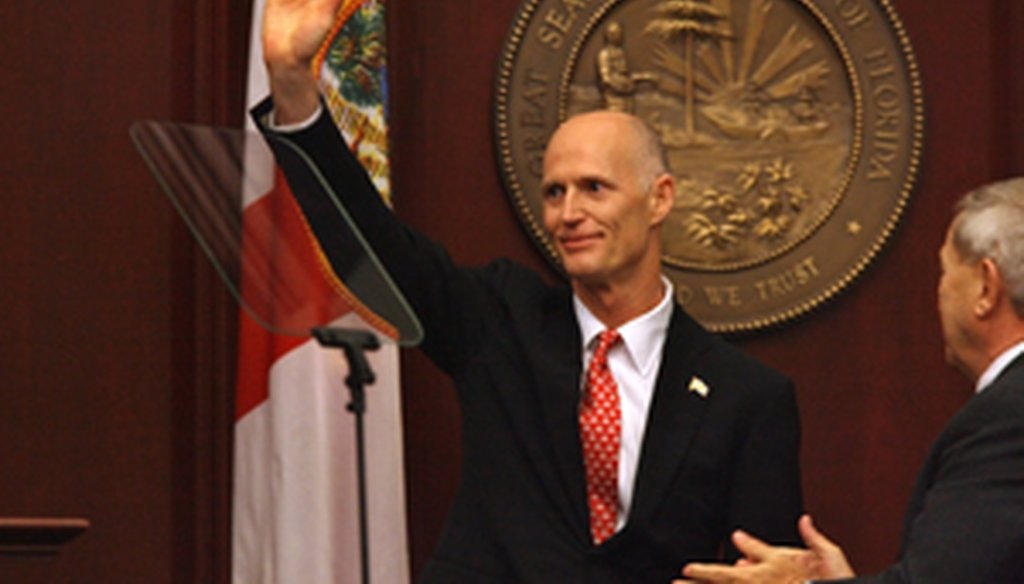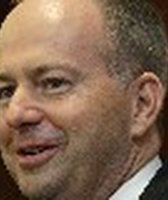Stand up for the facts!
Our only agenda is to publish the truth so you can be an informed participant in democracy.
We need your help.
I would like to contribute

Gov. Rick Scott delivers his first State of the State speech.
Florida Gov. Rick Scott used his first State of the State speech to push hard for his budget-cutting, tax-cutting, job-growing agenda. Here’s how he fared on the Truth-O-Meter.
"Last month, I delivered to you a budget that puts that plan into action and cuts taxes by $2 billion," Scott said on March 8, 2011, to the combined state House and Senate. "These tax cuts put money back in the hands of families and business owners who will grow private sector jobs."
We checked the math: $459 million this year and $1 billion next year by cutting the corporate income tax. Another $600 million in lower property taxes. Plus $180 million in lowered taxes to the state's water management districts. We've got a list of more cuts that add up to $1.7 billion.
Bottom line: Scott overestimated, by about 15 percent. But it's close enough to rate this one as Mostly True.
Scott used the forum to introduce several business leaders, including Dean Minardi, the chief financial officer of Bing Energy Inc., a company that uses nanotechnology to make hydrogen fuel cells. "Bing Energy, a California-based company, was courted by offers from several states, but Bing decided to come to Florida in December, and Tallahasssee, thankfully enough," Scott said.
"The reason Florida won? Mr. Minardi said it was our plan to eliminate the corporate tax."
That's a strong plug for the governor's job-growing efforts. And there's no question MInardi cited Scott's proposed trimming of the corporate income tax when the corporate move was announced Feb. 10. But there's also no question that Florida State University announced a commercialization agreement with Bing in September 2010 and that the company asked Leon County for tax breaks in October last year.
So Scott is presenting this move as just about the business tax, while he and Minardi are overlooking important other factors that were in place before Scott was elected in November. Of course businesses would be attracted by lower corporate taxes, but even that's not a done deal. The Legislature still has to weigh in. We rated this one Half True.
Scott touted his work to simplify state government, and cited his request to have the Division of Emergency Management report directly to him. But when we checked, we found that it already does. The statute that created the division in 1969 makes clear that the head of the division is to report directly to the governor. It's true that the division is located, bureaucratically, within the Department of Community Affairs -- but that department reports to the governor too.
This restructuring is barely any change at all, so we rate it Barely True.
Scott also reminded lawmakers and voters of his promise to freeze all regulations on his first day in office, saying, "On my first day in office, I ordered a review of every regulation in the pipeline and every contract exceeding $1 million." He's right, he did issue an order within hours of his inauguration to suspend all rule-making and all contracts worth more than $1 million.
But all three members of the Cabinet – Republicans all – declined to go along with the freeze on their agencies. No thanks, they said, we'll take control of our spending ourselves. And so far, we've found only one contract, for outpatient imaging medical services, that's actually been denied since the freeze was instituted. We rated this one Mostly True as well.
Scott also mentioned one of his most-visible promises, to sell the state airplanes. That was another quick action in his first month in office. The bids were opened, and the planes were sold and flown out of state last month. That one rated a True, even though there are lingering questions from powerful Senate Budget committee chairman J.D. Alexander about whether Scott had the authority to handle the sale the way he did.
After the speech, Democrats took turns criticizing Scott. One of them was former U.S. Rep. Alan Grayson, who went on MSNBC to excoriate the governor's budget proposals. Scott is "taking money out of children’s pockets dollar for dollar so he can stuff it in his own," Grayson said about the mix of corporate tax cuts and education funding cuts.
The cut to education next year is about $1.7 billion, including not replacing federal stimulus money and lowering the required local effort that counties make to pay for schools. But the corporate income tax cut the same year is only about $460 million, a third of the education cuts. It's true that over two years, Scott is proposing business tax cuts that equal about $1.5 billion.
But comparing a one-year schools cut with a two-year business cut doesn't cut it with us. We rated Grayson's remarks Barely True.
Our Sources
See individual PolitiFact Florida items.
































